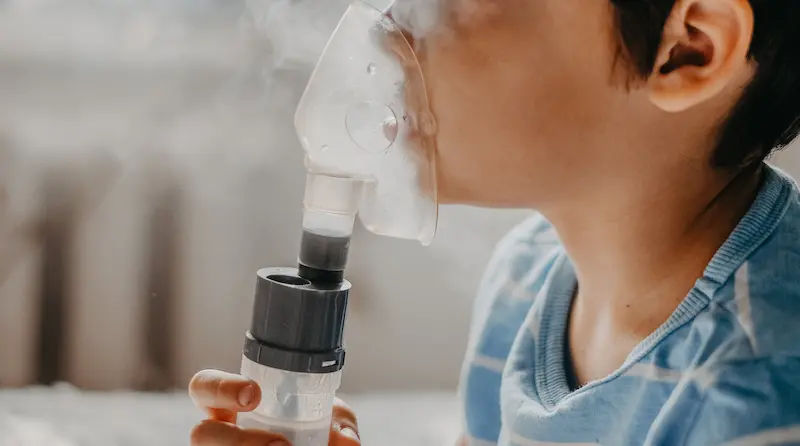Essential Oils for Congestion Relief: Research-Based Benefits
Can essential oils help with nasal congestion? Learn what research says, safe ways to use them, and evidence-based tips for stuffy nose relief.


Introduction
A stuffy, blocked nose can make even the simplest daily tasks feel uncomfortable—from sleeping and exercising to concentrating at work. Many people turn to natural options such as essential oils for nasal congestion because they’re easy to use, widely available, and often calming to the senses. But it’s important to understand what they can realistically do. This guide offers a clear, evidence-informed explanation of how essential oils may help, how they may not, and safe, practical ways to combine them with proven congestion-relief strategies for the best results.
Consult a Top Ayurveda Doctor for Personalised Advice
What Causes Nasal Congestion—and What Actually Helps
Nasal congestion occurs when the tissues lining the nose and sinuses become swollen and irritated. Even if mucus production increases, it’s often the swelling, not just the mucus, that makes breathing through the nose difficult.
Common Causes
Common causes for nasal congestion:
- Viral infections: colds and respiratory viruses
- Seasonal and indoor allergies: pollen, dust mites, pet dander, mould
- Sinus infections: swelling and blocked drainage pathways
- Environmental factors: dry air, smoke, strong fragrances, pollution
- Sleep and posture: lying flat can worsen swelling in the nasal passages
Evidence-Backed Relief Options
Some fool proof relief options are:
- Saline rinses or sprays: thin mucus and wash away allergens
- Humidified air: keeps nasal passages moist
- Hydration and rest: support natural mucus clearance
- Head elevation at night: reduces swelling and improves airflow
- Short-term medicines: decongestants or antihistamines when appropriate (check with a clinician or pharmacist)
Essential oils do not cure viral colds or treat sinus infections, but they may offer comfort, a subjective sense of easier breathing, or help you relax while your body recovers.
How Essential Oils May Help With Congestion?
Essential oils are concentrated plant extracts used primarily for inhalation or diluted topical application. Their effects for congestion are mainly sensory and supportive, not curative.
Possible Ways They Help
- Cooling or “opening” sensations: Menthol in peppermint triggers receptors that make the nose feel clearer, though airflow doesn’t always improve.
- Aromatic comfort: Pleasant scents can reduce stress and enhance well-being.
- Laboratory findings: Some oils show antimicrobial or anti-inflammatory activity in lab settings, but this does not equate to real-world decongesting effects.
Overall, research on inhaled essential oils for nasal congestion remains limited. While certain compounds, such as 1,8-cineole (found in eucalyptus and rosemary) have been studied, strong clinical evidence for essential oils as congestion treatments is still lacking.
Research Snapshots: Popular Essential Oils for Stuffy Noses
Essential oils for stuffy nose are:
Eucalyptus (Rich in 1,8-Cineole)
- What people report: A clean, sharp scent that feels “opening” and refreshing.
- Research insights: 1,8-cineole has been studied for respiratory symptoms and may reduce inflammation or mucus in some contexts. However, several studies use oral cineole capsules, not inhaled essential oils, so results can’t be directly applied to aromatherapy.
- Takeaway: May offer pleasant aromatherapy benefits and a sense of easier breathing. Use by inhalation or diluted topical application—never orally.
Peppermint (Menthol)
- What people report: Cooling, minty, and immediately refreshing.
- Research insights: Menthol stimulates cold receptors in the nose, improving the perception of airflow even if the nose remains physically congested. This can make rest or sleep more comfortable.
- Takeaway: Helpful for perceived relief. Avoid use around infants or young children due to airway sensitivity.
Tea Tree (Melaleuca alternifolia)
- What people report: Strong, medicinal scent thought to “clean the air.”
- Research insights: Shows antimicrobial activity in lab studies, but this does not directly translate to improved nasal congestion.
- Takeaway: Can be used for aromatherapy in adults if you enjoy the scent. Keep away from pets and never ingest tea tree oil.
Rosemary (Contains 1,8-Cineole)
- What people report: A fresh, herbaceous scent that can feel energising.
- Research insights: Contains compounds similar to eucalyptus, though strong evidence for congestion relief from inhalation is limited.
- Takeaway: May be pleasant to diffuse. Avoid high concentrations if you have high blood pressure or epilepsy—consult a clinician before use.
Thyme (Thymol)
- What people report: An intense herbal aroma that can feel sharp or stimulating.
- Research insights: Exhibits antimicrobial properties in lab studies, but evidence of benefit for nasal congestion is weak.
- Takeaway: Use sparingly and always dilute for topical application.
Lavender
- What people report: A calming floral aroma associated with relaxation and better sleep.
- Research insights: Studies show lavender may support relaxation and improved sleep quality.
- While it doesn’t directly ease congestion, better rest can make symptoms more manageable.
- Takeaway: Ideal for bedtime comfort during recovery.
Safe Ways to Use Essential Oils for Comfort
Safe ways to use essential oils are:
Diffuser Use
- Add a small amount of essential oil to a water-based diffuser following your product’s instructions.
- Use in a well-ventilated room and run intermittently (e.g., 30–60 minutes).
- Take breaks to avoid sensory overload.
Gentle Steam Inhalation
- Place a bowl of hot, not boiling water on a stable surface.
- Add 1–2 drops of essential oil.
- Lean over from a comfortable distance, keeping eyes closed, and inhale gently.
- Avoid burns—never use boiling water and never heat oils directly on the stove.
Diluted Topical Chest Rub
- Mix essential oil with a carrier oil (e.g., sweet almond, jojoba, fractionated coconut).
- Use low concentrations.
- Apply only to the chest area, never inside the nostrils or near the eyes.
Important Safety Notes
Important safety notes include:
- Never ingest essential oils—even small amounts can be toxic.
- Keep away from children and pets; ingestion or skin contact can be harmful.
- Avoid using oils on or near the faces of infants and young children; some scents can irritate or affect breathing.
- If you are pregnant, breastfeeding, have asthma, epilepsy, or chronic health conditions, speak with a clinician before use.
- Diffused scents may trigger symptoms in people with asthma or fragrance sensitivities.
- When using topically, always do a patch test to check for irritation.
- Choose reputable brands and store oils properly—tightly capped, away from heat and light.
When to Skip Oils and Seek Medical Care
The time to skip oils and see doctor includes:
Seek professional care if you experience:
- Symptoms lasting longer than 10 days, or symptoms that improve, then suddenly worsen
- High fever, severe facial pain or swelling
- Foul-smelling nasal discharge
- Wheezing, shortness of breath, or chest tightness
- Symptoms in a child under 2 years old
- Recurrent sinus infections or underlying conditions that may complicate recovery
These may require medical treatment rather than home remedies.
An Evidence-Informed Plan for Stuffy Nose Relief
Essential oils can provide pleasant, calming support, but the most reliable congestion relief still comes from simple, proven steps.
A Balanced Approach
- Use saline sprays or irrigation once or twice daily.
- Run a cool-mist humidifier and stay hydrated.
- Elevate the head of your bed to reduce nighttime congestion.
- Take warm showers to loosen mucus.
- If appropriate, use short-term over-the-counter options (ask a pharmacist or clinician).
- Add essential oils as optional comfort aids, remembering their effects are mostly sensory.
Conclusion
Essential oils can be pleasant, soothing additions to your congestion-relief routine, offering calming scents and a sense of easier breathing. While they do not cure colds or treat sinus infections, they can complement the proven essentials: saline, hydration, rest, and humidity. With safe use and realistic expectations, essential oils can help you feel more comfortable while your body naturally recovers. For persistent or worsening symptoms, medical advice is essential to ensure proper treatment and care.
Consult a Top Ayurveda Doctor for Personalised Advice
Consult a Top Ayurveda Doctor for Personalised Advice

Dr. Pepsy Jose
Panchakarma Practitioner
14 Years • BAMS, MD Ayurveda (Panchakarma)
Bengaluru
AYURRHYTHM HOLISTIC CLINIC AND PANCHAKARMA THERAPY, Bengaluru

Dr. Rik Sadhukhan
Ayurveda Practitioner
8 Years • BAMS
Kolkata
Vedhive Ayurveda, Ballygunge, Kolkata

Dr. Anjan Das
Ayurveda Practitioner
8 Years • Ayurvedacharya ( B.A.M.S )
Dumdum
Vedhive Ayurveda Clinic, Dumdum

Dr. Shiv Prakash Singh
Ayurveda Practitioner
19 Years • BAMS
Kolkata
Vedhive Ayurveda College Street, Kolkata
Consult a Top Ayurveda Doctor for Personalised Advice

Dr. Pepsy Jose
Panchakarma Practitioner
14 Years • BAMS, MD Ayurveda (Panchakarma)
Bengaluru
AYURRHYTHM HOLISTIC CLINIC AND PANCHAKARMA THERAPY, Bengaluru

Dr. Rik Sadhukhan
Ayurveda Practitioner
8 Years • BAMS
Kolkata
Vedhive Ayurveda, Ballygunge, Kolkata

Dr. Anjan Das
Ayurveda Practitioner
8 Years • Ayurvedacharya ( B.A.M.S )
Dumdum
Vedhive Ayurveda Clinic, Dumdum

Dr. Shiv Prakash Singh
Ayurveda Practitioner
19 Years • BAMS
Kolkata
Vedhive Ayurveda College Street, Kolkata
More articles from Nasal congestion
Frequently Asked Questions
Do essential oils actually unclog the nose?
They may help you feel less congested, especially menthol-rich oils like peppermint, but the effect is sensory. Saline, humidified air, and rest are more reliable for actual mucus clearance.
Which essential oils are most popular for nasal congestion?
Eucalyptus, peppermint, tea tree, rosemary, and thyme are commonly used. Lavender may help with relaxation, making symptoms easier to manage.
Is it safe to put essential oils inside my nostrils?
No. Essential oils should not be applied inside the nose. Diluted oils should be applied only to intact skin, away from the face and eyes.
Can I use essential oils for children with a stuffy nose?
Use caution. Do not apply oils near children’s faces, and avoid diffusing strong scents around infants or young children. Saline sprays and humidified air are usually safer alternatives. Speak with a paediatric clinician if unsure.
What’s the best way to use essential oils for a cold at night?
Try a short diffusion session before bed or a warm shower with a drop or two on the shower floor away from direct contact. Keep the room ventilated, use low amounts, and stop if you or a family member notices irritation or coughing.




